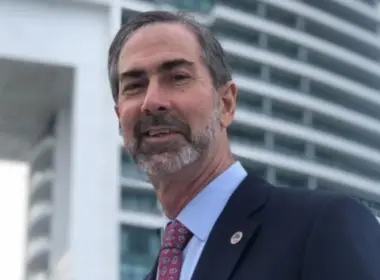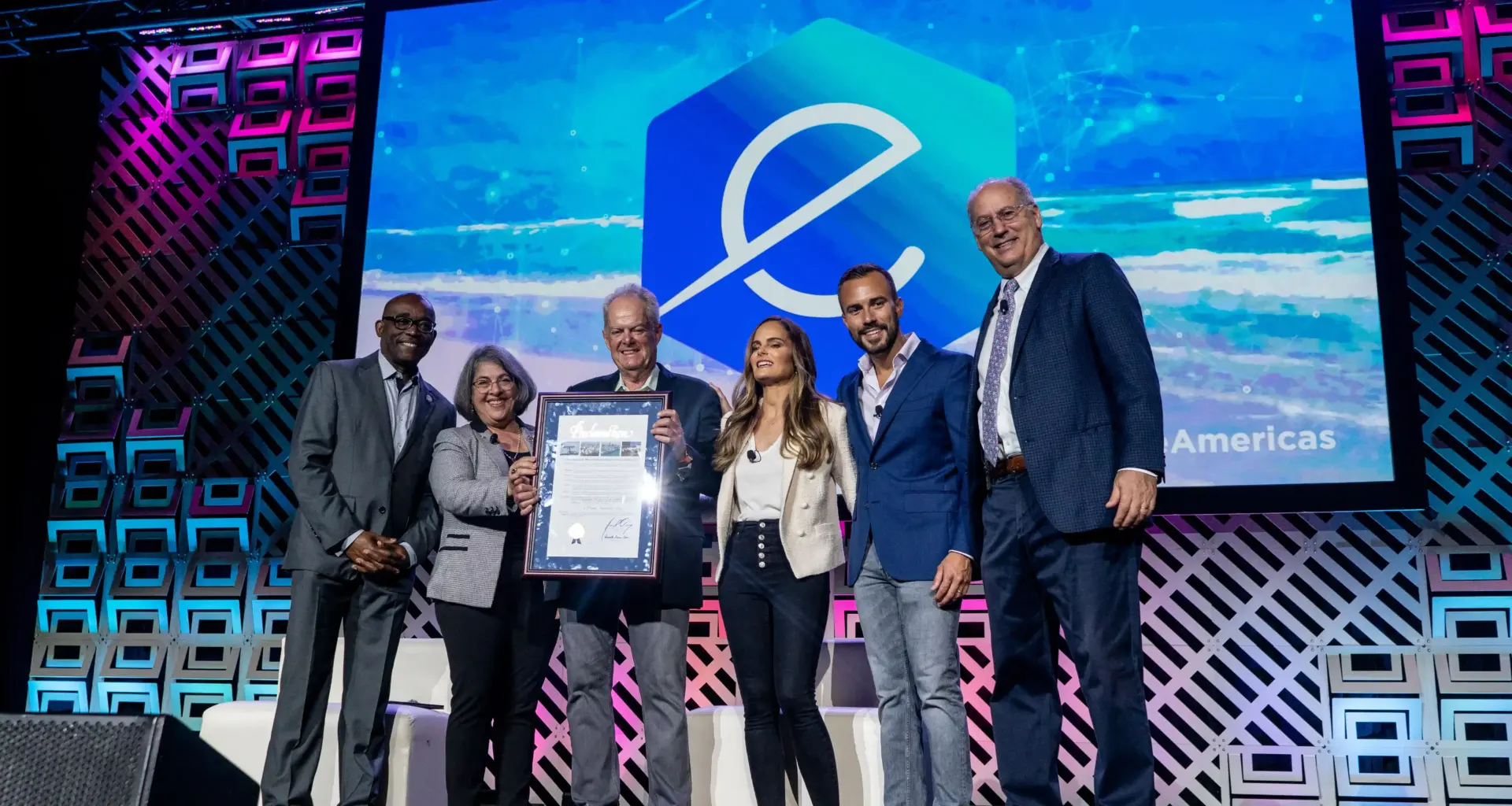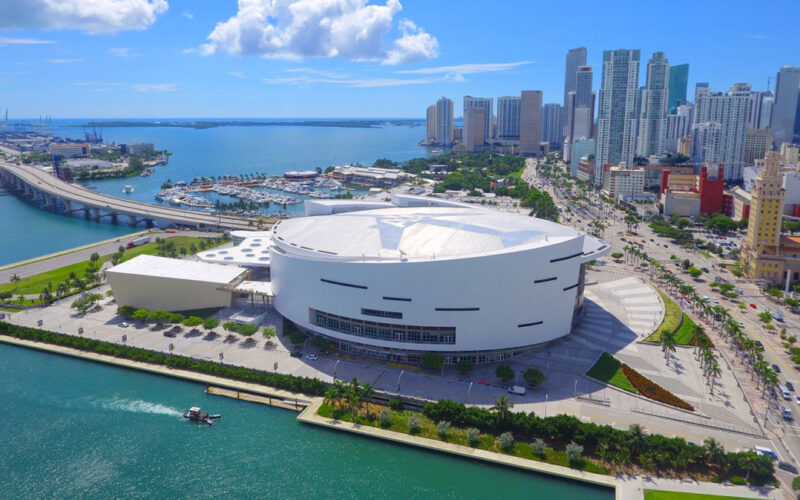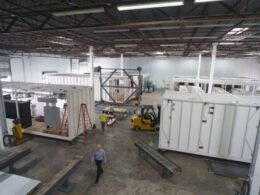How Miami’s annual high-tech event has created an ecosystem
By Doreen Hemlock
Some call it the “connective tissue” of Miami’s tech ecosystem. Others describe it as an “anchor.” For startups, it’s a prized platform to gain visibility. For more established companies, it’s a partner to link with promising investments and hire new talent. For governments, it’s even a trusted advisor. When some 20,000 people from 50 countries converged in Miami Beach this April for South Florida’s largest tech conference, it might have seemed reasonable to view the event organizer, eMerge Americas, as a successful show producer. After all, the international conference has more than tripled attendance since its 2014 launch and woos headliners like spiritual guru Deepak Chopra and this year, U.S. football legend Tom Brady. This year alone, some 100 startups competed for more than half a million dollars in funding and prizes.
But while the show remains a centerpiece, eMerge Americas has blossomed into far more than that. The group created with the goal of making Miami a tech hub for the Americas has become a year-round platform, a convener of pitch competitions across the hemisphere, and a key source of information for the tech community. Indeed, it’s helped catalyze tech growth so strongly in South Florida that it’s now widened its mission and aims to transform Miami into a global tech hub.
Even the structure of eMerge Americas has evolved. First a nonprofit, it’s now become a private entity and attracted such well-known investors as baseball star Alex Rodriguez and venture capital firm Florida Funders. These days, it’s also looking to add a venture capital component to help finance young tech ventures.
“We’ve been very fortunate to have access to great deal flow,” says CEO Felice Gorordo, noting 80 of the companies that took part in the Startup Showcases at its April conferences have raised more than $1 billion in venture capital. “A logical extension for us is to invest in these startups institutionally.”
MANNY MEDINA AIMS “TO CONNECT THE DOTS”
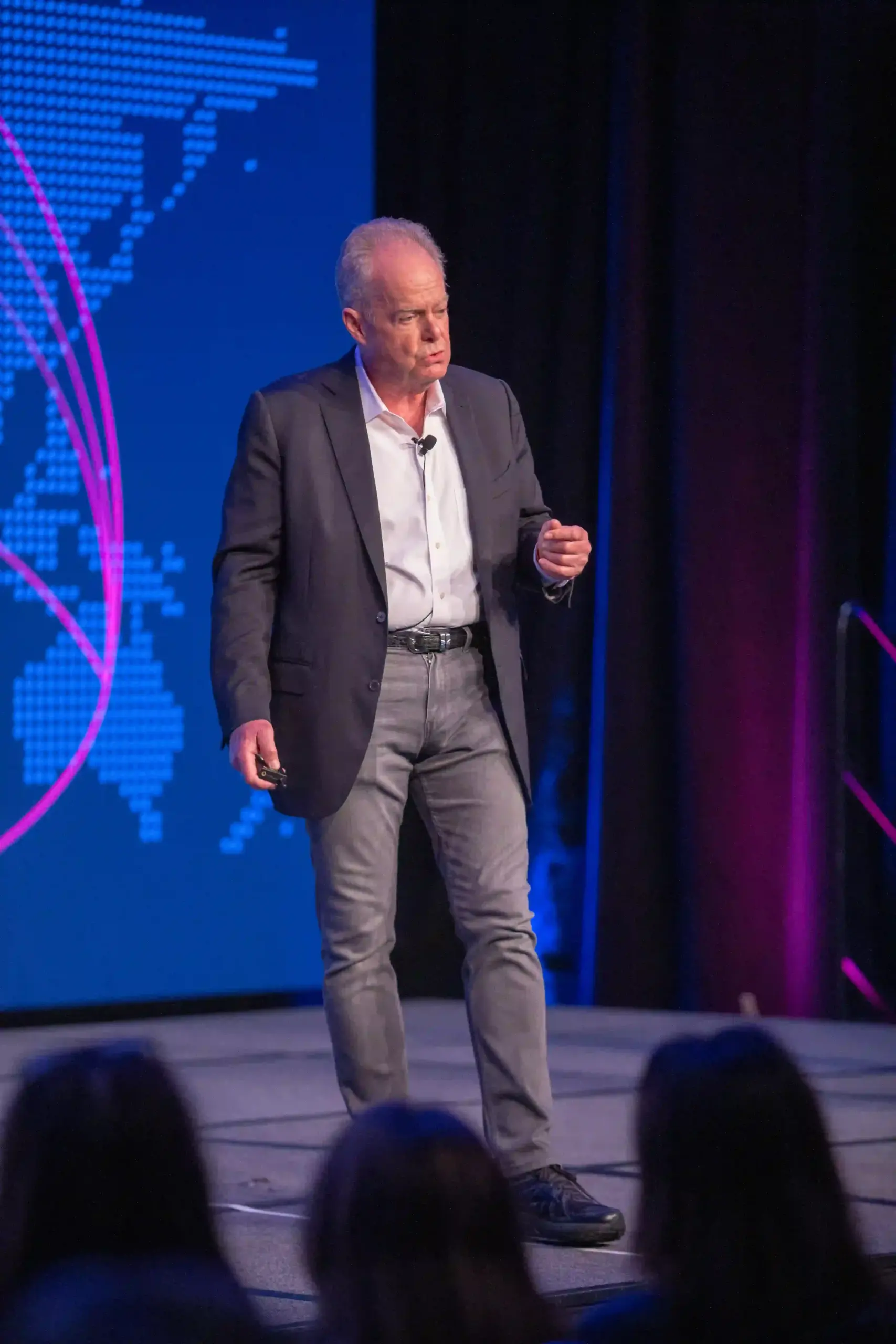
The effort began in 2011. Miami entrepreneur Manny Medina had just sold his data center company Terremark Worldwide to Verizon in a $2 billion deal. Relaxing in the Florida Keys, he realized there was no good reason that entrepreneurs in Miami had to go to Silicon Valley and New York to get funded. Miami had all the elements to become a successful tech hub. All it needed was help to connect the dots.
Medina put together a steering committee of some 40 people interested in that vision, including lawyer Francis Suarez, now mayor of Miami. He backed studies through the nonprofit Technology Foundation of the Americas which he created, and he laid out a plan to develop the tech hub, working with five key stakeholders: entrepreneurs, investors, corporations, academia, and government, leveraging Miami’s role as a gateway to Latin America and the Caribbean. He envisioned a conference to build momentum.
The first eMerge conference in 2014 drew some 5,000 people, with help from Medina’s pal Pitbull, the singer and businessman Armando Christian Perez, also known as Mr. 305, who gave a talk on entrepreneurship and created buzz. The eMerge team kept busy before and after – sending out newsletters, meeting with diverse groups in South Florida and the Americas, and preaching Miami’s potential as a tech hub.
“The eMerge platform kept the tech conversation going when it wasn’t always popular,” says Marc Billings, who launched pioneering accelerator Incubate Miami in the 2010s, founded several South Florida tech ventures, and is now building the BlackDove network of digital art galleries from Miami’s Wynwood district. “If it weren’t for eMerge, all the hard work around town may have gone unnoticed. They were the cohesive brand that showed the aggregate progress of the community.” He calls eMerge “the cohesive tissue that links the community when there’d otherwise be gaps.”
By 2019, before the COVID pandemic, eMerge drew some 16,000 people from 40-plus countries to its April conference, with booths representing nations as distant as Israel. COVID halted the show in 2020 and 2021, but its work continued through meetings, reports, and news online.
FERTILE GROUND DURING COVID
Then, suddenly, during COVID, tech entrepreneurs and financiers from higher-tax states with colder climates began streaming into South Florida, generating media attention across the U.S. and globally. Miami racked up the strongest tech job growth in the country, with record funding for local startups.
“Many people think it all happened during the pandemic, that people came from California, New York, and Chicago” to put Miami on the world tech map, says Miami-Dade Mayor Daniella Levine Cava. “But we had fertile ground because of what Manny [Medina] had created. We already had a very vibrant tech ecosystem [by 2020]… Manny was ahead of the curve… He saw what others did not see at that time, that we had a county made up of very ambitious entrepreneurs, that we are the bridge to Latin America, and that we can and already do bring major funders and investors to the table.”
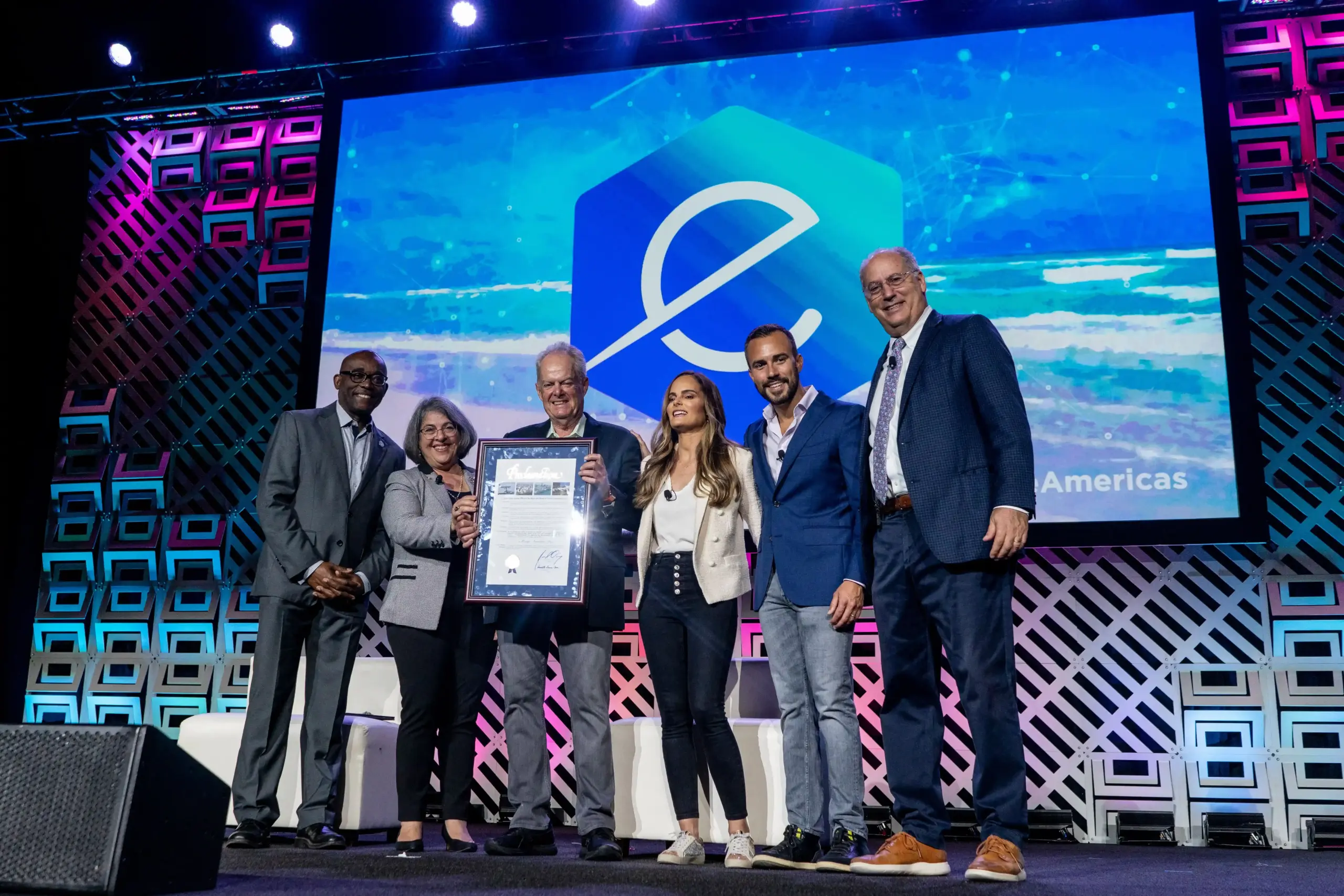
As mayor, Levine Cava works closely with eMerge, speaking at its April shows and relying on the group as advisors. She credits eMerge as the “the anchor” for what’s become Miami Tech Month, a series of conferences, events, and celebrations on tech topics from Web3 to NFTs and beyond. She says eMerge also helped her develop the nonprofit Miami-Dade Innovation Authority. That group gives grants to ventures to help solve such local challenges as housing and transit, with grantees invited to pilot their solutions with the government. It recently started up with $3 million each from the county, the Knight Foundation, and hedge fund Citadel’s CEO Ken Griffin, who moved from Chicago to Miami during COVID.
MELISSA MEDINA KEEN TO INCLUDE THE UNDER-REPRESENTED
While Cuba-born Manny Medina dreamed up eMerge to give back to his adopted home, it’s his Miami-born daughter Melissa who’s been developing its activities. She
was a member of the founding team and has served as president since 2018. Now a mother of five, Melissa helped organize the Women in Tech summit at eMerge’s second conference in 2015 to “empower and inspire women,” and she’s now ensuring that women are “completely threaded into everything we do.” Women now represent about half the attendees and many of the speakers at its April show.
“We’re not your typical tech conference that’s very male-dominated,” Melissa says. “We want to be reflective of our community, and we have one of the most diverse communities in the United States.”
Melissa aims to bring in not just women but also Latinos, Black people, and other under-represented groups into the tech scene, joining with numerous organizations on panels, pitch competitions, and varied events in order to expand access. On a Thursday evening in February, for example, she introduced a panel of Black tech entrepreneurs at Miami Beach restaurant Grown, which is owned by Shannon Allen, the wife of NBA basketball star Ray Allen. The event was backed by Chase bank and offered treats by local Black businesses like Chelle’s Cutie Pies, a maker of vegan, Japanese sweet potato desserts.
“You cannot build in a silo without thoughtful conversation. All of our organizations are pieces of a beautiful puzzle building together,” says Melissa. “Our role at eMerge is telling the story and connecting the dots among key stakeholders… with a pay-it-forward mentality.”
Kenasha Paul, who runs the FIU VentureMiami Opportunity program for female entrepreneurs of color, applauds eMerge’s responsiveness. After telling Melissa about limited access to funders for her cohorts, Medina invited her group to partner on a brunch with funders during eMerge’s La Casa event linked to Miami Art Week, she says. “Melissa is super passionate about making sure it’s an inclusive tech ecosystem, so anyone who puts themselves out there and does the work has access to opportunities,” says Miami-born Paul.
A KEY PLATFORM FOR STARTUPS TO NETWORK
Francisco Cornejo knew none of that when he heard about a pitch competition for startups in his native Ecuador. In late 2019, he and his wife Daniela Vega created an app that combines stories, music, and massage to help children sleep better and build emotional connections with their parents. eMerge helped organize the event in Quito with business accelerator Endeavor, offering winners a fast-track into the Startup Showcase at its next April conference. Their Storybook App won.
The family had decided that in order to scale their venture they had to move to the bigger, better funded U.S. market and was looking into known tech hubs in California and elsewhere. Thanks to eMerge and its newsletters, they began researching Miami as an option too. In 2022, the family relocated to South Florida, and since then has won more than 15 competitions from backers as diverse as Google and the Miami Herald, taking in millions of dollars in prizes and venture capital investments for Storybook App.
“Everything began with eMerge,” says a grateful Cornejo. “The biggest value has been networking. The more events, the more contacts, the better. The greatest value someone can give is to connect you.”
The challenge now is keeping the momentum going. CEO Gorordo says the group has expanded outreach since 2018, initially visiting Brazil, Mexico, Argentina, and Chile yearly, and more recently adding stops in Ecuador and the Dominican Republic, to meet and host pitch competitions with partners. The group works with a consortium of universities across the Americas that has been forged with the University of Miami.
Still, there are limits on how much Gorordo, Melissa Medina, and their eight-member eMerge staff can do without hiring more temporary crews, as they already do for their April conference. “I don’t think any one of us would have expected this growth,” says Gorordo, a former White House fellow who earlier led tech ventures and founded a nonprofit. He hopes newcomers to Miami – especially well-funded U.S. transplants – will help “take Miami to the next level,” assisting with solutions for such local challenges as transit and housing, and becoming a “beacon” for others to join hands-on with the community.
Melissa Medina also seeks to leverage incoming wealth in an inclusive way, “to not create larger divides in our city and to make sure we provide opportunities for the under-represented.” Amid the success, entrepreneur Billings says it’s important Miami “not lose its identity,” born largely from its eager immigrants, “the grit, the passion, and determination that has made it attractive for others to come.”
That discussion continued at eMerge’s April conference this year and surely will advance in years to come, together with talks on virtual reality, artificial intelligence, and other topics that we cannot yet imagine.



